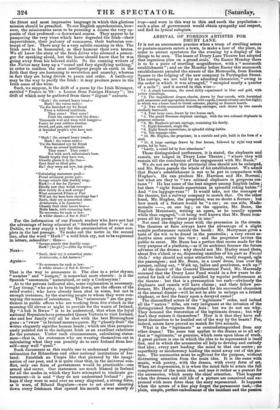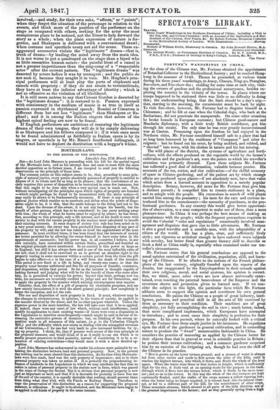ARRIVAL OF FOREIGN ARTISTES FOR DRURY LANE.
IT is not an uncommon practice when a troop of strolling actors or posture-masters enters a town, to make a tour of the place, in order to attract spectators for the evening by a display of the things to be seen. The lessee of Drury Lane Theatre has adopted that ingenious plan on a grand scale. On Easter Monday there is to be a piece of startling magnificence, with a " mammoth establishment "; and on the Monday before Easter this mammoth establishment paraded the streets of the Metropolis, from Euston Square to the lodging of the new company in Farringdon Street. The cortege, we are told by an admiring chronicler, " owing to the order in which it was arranged," " occupied nearly a quarter of a mile"; and it moved in this wise— "1. A single horseman, the steed richly caparisoned in blue and gold, with yellow trimmings.
" 2. The magnificent dragon chariot, drawn by four camels, with burnished gold ornaments and appropriate devices, with cupola, (stands twenty-one feet high); in which was a brass band in Greek costume, playing an Eastern march.
"3. Two richly-ornamented travelling-carriages, each drawn by two camels similarly harnessed.
" 4. Four large vans, drawn by two horses each.
" 5. The grand Burmese elephant carriage, with the two colossal elephants in gorgeous costume.
" 6. Mr. Hughes's private carriage, containing his family. "7. Eight horsemen, single file. "8. Eight female equestrians, in splendid riding-habits.
" 9. Ten luggage-vans.
" 10. Mr. Hughes, the proprietor, in a curricle and pair, built in the form of a shelL
" 11. A large carriage drawn by four horses, followed by eight very small ponies, led by boys.
" Lastly, a camel led by four attendants."
Those distinguished performers, it is stated, the elephants and camels, are lodged in Drury Lane Theatre ; " where they will remain till the conclusion of the engagement with Mr. Bunn."
We do not see why this provincial idea should not be enlarged, and Mr. Bunn parade the whole of his establishment. We emit that Bunn's establishment is not to be put in comparison with Hughes's. He can produce Mr. Harrison and Mr. Burrani; but what are they to " two colossal elephants in gorgeous cos- tume "? He has some of the best singers among English ladies ; but then "eight female equestrians in splendid riding habits "! And " ten luggage-vans"! It would take, not the manager of the theatre, but a railway company to match that. On the other hand, Mr. Hughes, the proprietor, was no doubt a feature ; but how much of a feature would be "a car ; on one aide, Made- moiselle —, on one leg ; on the opposite, Mr. Bunn, the English Metastasio, writing an opera, as he usually appears while thus engaged,"—it being well known that Mr. Bunn com- poses all his poems " stans pede in uno."
Nor need the display cease with the procession in the streets. The theatres at fairs always have the advantage of a slight sample performance outside the booth : Mr. Merryman gives a taste of the wit to be found in the penetralia ; a very sweet se- ductive siren courts the view ; and the proprietor invites the public to enter. Mr. Bunn has a portico that seems made for the very purpose of a platform,—as if its architect foresaw the future advance of the drama : why should not Mr. Harley stand there, about five o'clock or so, dispensing snatches of his part as Fuzzel Oola ? why should not some attractive lady, ready rouged, ogle the passengers ; and Mr. Bunn, in a court dress, lean over the parapet, calling out, " Walk up, ladies and gentlemen, walk up !" At the dinner of the General Theatrical Fund, Mr. Macready assumed that the Drury Lane Fund would in a few years be de- serted for lack of claimants qualified by regular performance at the theatre : but that is a presumption too rash—obviously the elephants and camels will have claims ; and their fellow per- former, Mr. Harley, is distinguished for his successful eloquence at the annual dinner—will he not be able to enlarge on a retired elephant, or feed the fancy upon a decayed camel ? The discomfited actors of the " legitimate " order, and indeed all the " native " tribe, are very indignant at the invasion of the distinguished foreigners from Asia : but we do not see why. They demand the restoration of the legitimate drama; but why don't they restore it themselves ? How is it that they have suf- fered themselves to be hustled out of the way by the beasts? For, indeed, actors have proved no match for live animals.
What is the " legitimate" as contradistinguished from any other drama? The same test applies to the drama as to all art: that is " legitimate," or genuine, which rests upon ideas of truth. A great picture is one in which the idea to be represented is itself fine, and in which the accessories all help to develop and embody that idea ; every part leading the mind to that one centre ; no superfluity or incoherency leading the mind away out of the pic- ture. The accessories must be sufficient for the purpose, without distracting attention from the main idea. It is the same with music, with poetry, with the drama, with every form of art. When art degenerates, it is when the mind fails to attain the full completeness of the main idea, and uses it rather as a pretext for the accessories, which usurp the chief attention. That happens when the dresses and still life of a picture are conceived and ex- pressed with more force than the story represented. It happens when the actors of a fine play forget the paramount task,—the plain, simple, perfect embodiment of the incident and the passion involved,—and study, for their own sake, "effects," or "points"; when they forget the situation of the personage in relation to the events, and think more of the position of the performer on the stage as compared with others, seeking for the actor the most conspicuous place to be noticed, not the fittest to help forward the story as a whole ; when the plain expression of nature is for- gotten, and Shakspere is delivered with a conventional drawl ; when costume and spectacle usurp not aid the scene. These ex- aggerated accessories violate the " legitimate " drama—that is, truth of drama—by leading the mind away from the main idea. It is not worse to put a quadruped on the stage than a biped who as little resembles human nature: the painful bleat of a camel is not a greater impertinence than the sing-song of a " respectable actor' after the current pattern. The " legitimate drama" was deserted by actors before it was by managers ; and the public do not seek it, because they sought it in vain. Mr. Hughes's prin- cipal performers will at least play the parts of elephants and camels with propriety : if they do not attain to verisimilitude, they have at least the inferior advantage of identity ; which is not so offensive as the violation of all likelihood.
It is still more untrue to say that Covent Garden is deserted by the " legitimate drama": it is restored to it. Passion expressed with consistency in the medium of music is as true in itself as passion expressed in rhythmical speech; Rossini or Cimarosa is different from but not less "legitimate" than Shakspere or Ra- phael ; and it is among the Italian singers that actors of the highest epical feeling are now to be found.
If English performers are ambitious of restoring the legitimate drama of their own tongue, they will do it by simply delivering it as Shakspere and his fellows composed it : if it were once more to be found administered as faithfully as Italian opera is by its singers, or spectacle is by Mr. Bunn's fourfooted colleagues, it would not have to deplore its destitution with a beggar's whine.



































 Previous page
Previous page